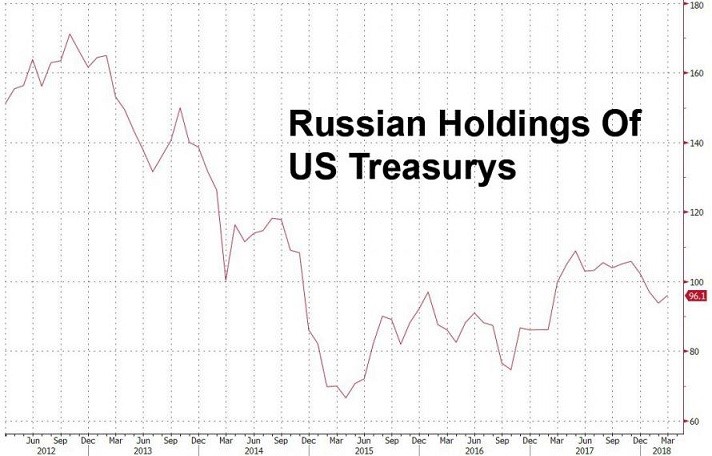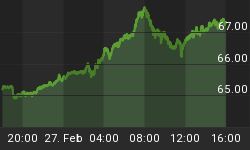Russia has been pro-actively trying to minimize its exposure to its American enemy No. 1 through a number of ways, including replacing the dollar in crude oil settlements as well as dumping U.S. Treasuries.
Russia has been cutting its holdings of U.S. debt by nearly half over the past six years, though it still remains one of the largest holders of U.S. Treasuries.

(Click to enlarge)
Source: Zero Hedge
Russia's decision (together with Iran and Turkey) to ditch the dollar in crude oil payments in favor of the euro was driven by what it termed as limited access to the greenback resulting from long-standing U.S. sanctions.
Russian Gold Rush
But in an even clearer indication of its intent to eventually ditch the greenback as its reserve currency, Russia has been bulking up its gold reserves at an unprecedented rate.
The country has been on a long unbroken streak of 39 consecutive months of gold additions, one of the longest by any government in the world.
Russia and China own some of the world's largest gold reserves.

(Click to enlarge)
Source: World Gold Council
But the giant gold producer is still not content with its torrid pace of accumulation, or its place as the planet's third-largest producer. Russia now aims to ramp up gold output by 50 percent over the next seven years and by nearly 100 percent by 2030.
Russia produced 8.8 million ounces of the yellow metal in 2017, good for 8.3 percent of global production and the third-highest in the world. Now it plans to increase production by another eight million ounces by 2030 thus matching the pace by China which has doubled its own output over the last 14 years. That will effectively make Russia the world's second-largest producer behind only Australia. Related: Gold Could Head Lower In Coming Weeks
Russia hopes to hit that goal by focusing more on the gold hubs of Amur and Magadan as well as the Siberian city of Irkutsk.
Minimal Impact on Gold Prices
Russia's ambitious gold program is, however, unlikely to have any major impact on overall world supply or prices.
The country's objective to double gold production by 2030 would lead to roughly half a percentage point increase in global production each year, ceteris paribus. That would hardly be enough to offset declining production elsewhere, let alone depress gold prices. Global production increased to 3,268.7 tonnes in 2017 up from 3,263 a year earlier. That marked the smallest increase since 2008.
Gold production in China--the world's largest producer, accounting for 15 percent of annual output--could already have hit a production plateau. In 2017, China recorded a nine-percent decline in gold output after nine consecutive years of increase. The decline was chalked up to tighter controls by Chinese authorities who have been closing down smaller mines, many of them deemed unsafe.
If anything, China's own output is unable to meet local demand, and the situation could get worse. The country produced 420.5 tonnes in 2017 compared to demand for 953.3 tonnes.
Further, the Beijing government prohibits Chinese gold companies from exporting any gold. China's sway on gold matters is even bigger than Saudi Arabia's on oil due to the former's larger control on production.
By Alex Kimani for Safehaven.com
More Top Reads From Safehaven.com:
















